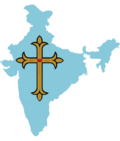History
IPC traces its origins to the Pentecostal revival in India during the early twentieth century. The movement was initiated by Pastor K. E. Abraham, originally associated with the Jacobite Syrian Christian Church. After what he described as an experience of the baptism in the Holy Spirit in 1923, he separated from his former denomination Kerala Brethren and began to preach Pentecostal doctrine. [4] [8]
The first united Pentecostal convention related to the IPC movement was held in April 1925 in Ranny, Kerala. The meeting brought together several early Indian Pentecostal leaders, including Pastors T. G. Oommen and P. M. Samuel. [9] [10] These early leaders emphasised restoring New Testament Christianity under indigenous Indian leadership, independent of Western missionary control. [11]
In 1933, a council of twelve ministers was formed, and P. M. Samuel was elected the first President of the fellowship. The denomination was formally registered as The Indian Pentecostal Church of God on 9 December 1935 in Eluru, Andhra Pradesh, marking the establishment of the organisation as a legally recognised body committed to spiritual and administrative self-reliance. [12] [13]
The denomination expanded rapidly across South India, especially among Malayalam-speaking Christians, and later throughout India and regions with significant Indian diaspora populations, including the United States, Canada, the United Kingdom, and the Middle East. [1] [4]
A notable schism occurred in 1953, resulting in the formation of the Sharon Fellowship Church. [9]
This page is based on this
Wikipedia article Text is available under the
CC BY-SA 4.0 license; additional terms may apply.
Images, videos and audio are available under their respective licenses.


